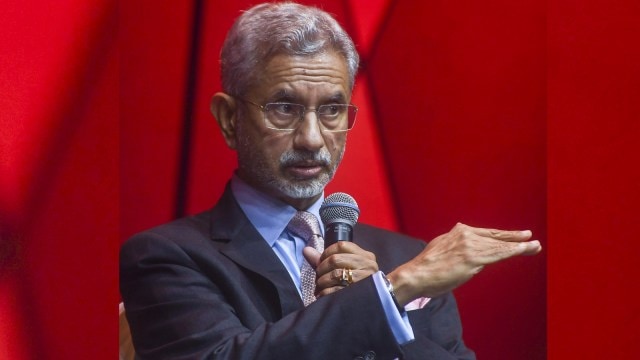Jaishankar: A lot of countries are nervous about US, we are not one of them
Stating that the world is increasingly appreciating the India story, External Affairs Minister S Jaishankar said the focus on economic policy has in fact become the key change in India’s foreign policy.
 External Affairs Minister S Jaishankar at an event in Mumbai on Sunday. (PTI)
External Affairs Minister S Jaishankar at an event in Mumbai on Sunday. (PTI)“I know today a lot of countries are nervous about the US, let’s be honest about that. We are not one of them,” External Affairs Minister S Jaishankar said Sunday.
He also said Prime Minister Narendra Modi was “among the first three calls” that Donald Trump took after winning the US presidential election.
Jaishankar was speaking at the Silver Jubilee celebrations of the Aditya Birla Scholarships Programme in Mumbai. Also present were Harvard University professor and political philosopher Michael J. Sandel and Aditya Birla Group chairman Kumar Mangalam Birla.
Speaking at the Silver Jubilee Celebrations of the @AdityaBirlaGrp Scholarships Programme in Mumbai. https://t.co/vxvkK3tN8B
— Dr. S. Jaishankar (@DrSJaishankar) November 10, 2024
Asked if the outcome of the US presidential election is impacting Indo-US ties, the External Affairs Minister said, “Prime Minister Modi has actually built rapport across multiple presidents of the US… There is something natural in terms of how he forges those relationships.”
Stating that the world is increasingly appreciating the India story, he said the focus on economic policy has in fact become the key change in India’s foreign policy in contemporary times which is purposed to advancing national development apart from ensuring national security.
“We no longer measure each other just by military capabilities or political influence, but take into account technology strengths, economic resilience, human creativity and societal well-being. No nation can truly develop in a unidimensional manner. And large ones, in particular like us, must have some basic self-sufficiency,” he said, emphasising on Atmanirbhar Bharat.
Pointing to the changing world demography where demands for services are growing and many societies are falling short, Jaishankar said this is an opportunity for India. “A better educated, skilled and confident generation of Indians will have openings that could not be contemplated earlier. In fact, the interest in Indian talents is probably the most frequent theme in my conversations with foreign governments and corporates.”
“Anticipating this possibility, we have steadily concluded mobility agreements that ensure better access and fair treatment for our professionals. More than 20 nations are currently covered, with others underway,” he said.







